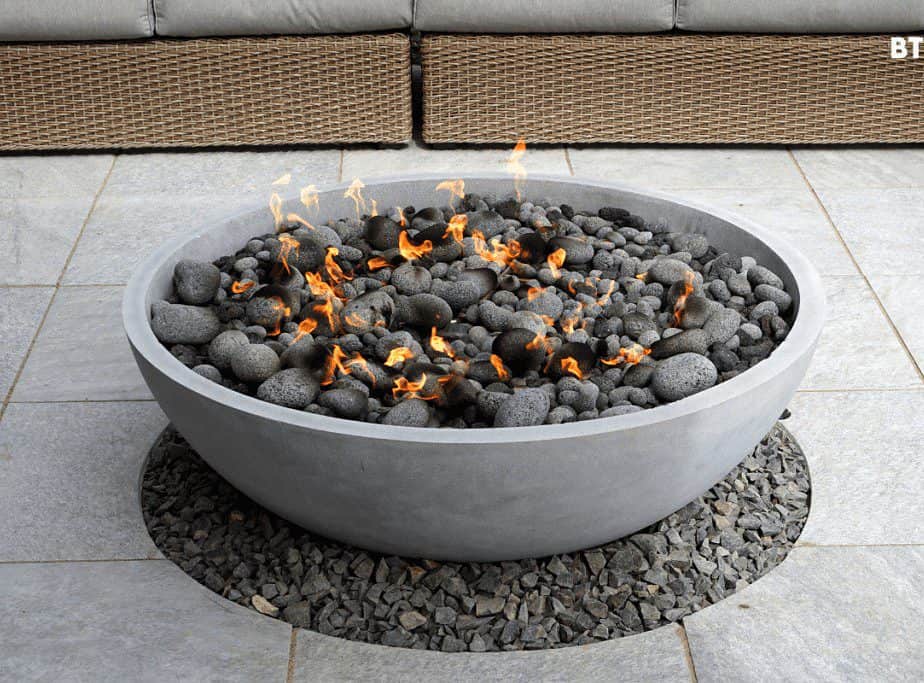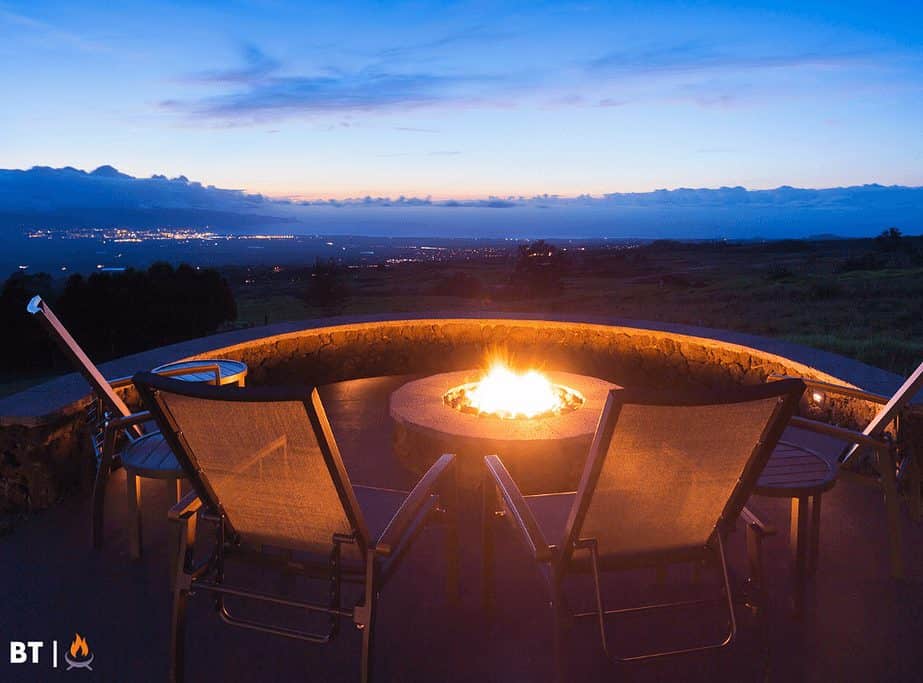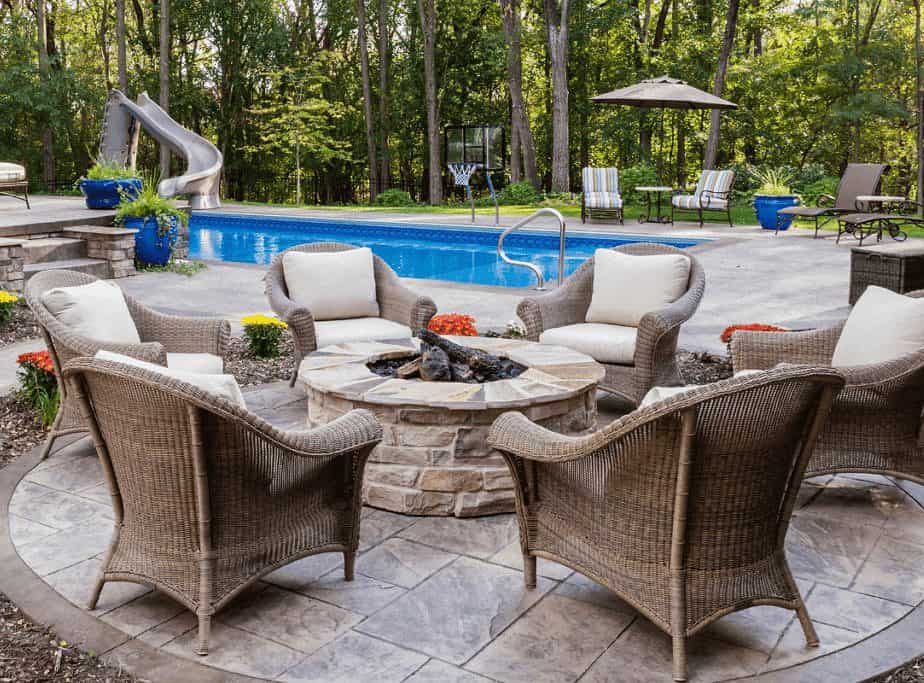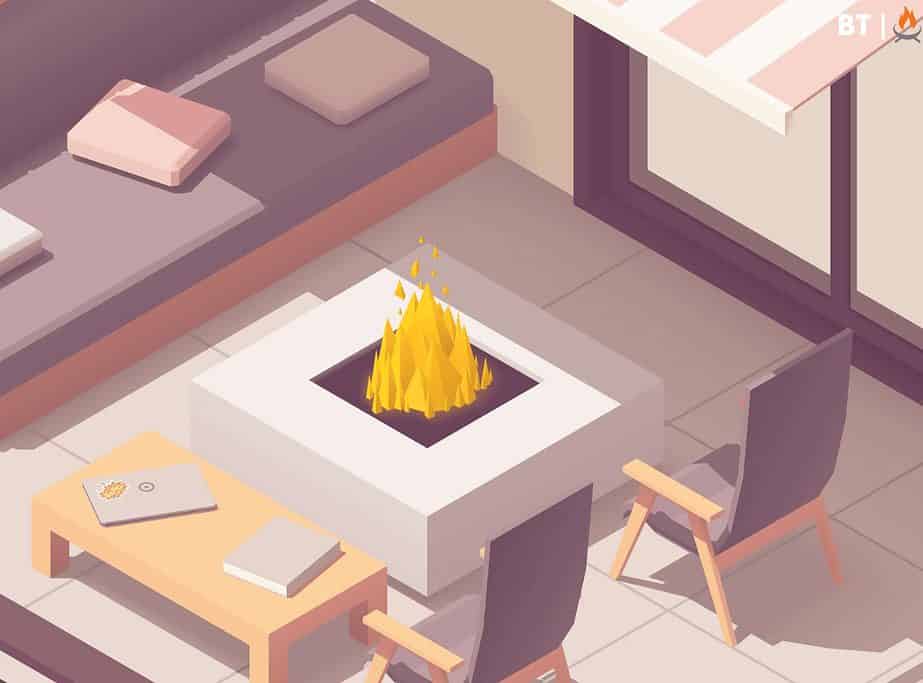By J. Herwick
We use affiliate links and may receive a small commission on purchases.
Read more about us.
Propane fire pits can add a pleasant ambiance to your backyard or patio. However, a concern for some gas fire pit buyers is knowing the smell of propane is less than pleasant and wondering if that will be an issue when using them.
How likely are you to smell that gassy smell if you buy and/or install a propane fire pit?
Nobody wants a backyard that smells like rotten eggs when trying to relax in front of a warm fire. So if you are in the market for a new gas fire pit, getting to the bottom of this may be your priority.
Generally speaking, propane fire shouldn’t smell bad. Propane is clean-burning, meaning that you shouldn’t smell much of anything from the flame. If you smell anything more than the occasional whiff of gas, you should turn off the flame immediately and have the unit serviced before turning it on again. That smell could be indicative of a potentially dangerous gas leak.
There are a few smells that may emit from a propane fire pit. While none of them should be particularly intense, let’s run through what your nose can expect when using a propane gas fire pit.

The Smell of Propane Gas
Rotten eggs…raw sewage…a swamp. You get the picture. These are just a few of the ways that people describe the smell of propane. It’s not a pleasant smell. However, if your fire pit is installed correctly and safely, you shouldn’t smell much of it all.
Propane is the fuel that powers your fire pit. It’s a fuel source that burns clean. This means that it leaves behind almost no contaminants or particulates after burning. There isn’t anything to smell; it’s all burned away.
If Your Fire Pit Smells Like Propane Something’s Wrong
If you can smell propane while the fire pit is running, this means that there’s propane that isn’t being burned, likely from a leak. If this leaked propane comes into contact with the open flame, it can cause an explosion.
You may smell the occasional puff of propane, and this is nothing to worry about. Sometimes a little bit of gas will sneak past the flame without getting burned and make its way to your nostrils.
However, if the smell is strong and sustained, don’t take chances. Switch it off and call a repair person.
Some experts even recommend avoiding the use of electricity or landlines on the same property as these could potentially generate a spark. A propane explosion could damage your property and injure people at your home.
Be careful. These types of incidents are infrequent, but you don’t want to be the unlucky exception.
Don’t let safety concerns be the reason you steer clear of a propane fire pit. As long as you’re careful and trust your nose, you won’t have anything to worry about.

The Smells of Setup
Depending on the materials used in your fire pit. You may need to allow the fire pit to burn for an extended period as a part of the installation.
This is especially true if you are using fake wood or certain types of paint inside the pit. A long burn allows the heat necessary for these products to cure fully. You may need to allow a new fire pit to burn for three hours or more.
During this process, you may smell some unpleasant chemical odors. This is nothing to be alarmed about. It is merely a part of the installation process.
The smell may occur on the first few uses but will quickly go away and should not return.
Some Materials Smell More than Others
There are a few different materials that people will line the bottom of their fire pits with. Necessarily, these materials are heat resistant and won’t break down or look bad after prolonged exposure to heat. Some of these materials include:
- Lava rock
- Glass
- Silica Sand
- River rock
Some fire pit owners complain that they notice scents coming off lava rock or river rock when heated. The smell of silica sand will vary depending on its purity.
If you are sensitive to these types of smells, you may want to consider glass as a material for filling your pit.
Take a look at my article Why Use Lava Rock for a Fire Pit? for more.

Other Smells
The reality is that almost anything will give off some amount of odor when heated. This means that you can have smells coming off of the container, the piping, the fill material—anything close enough to the heat source.
This creates an almost limitless number of factors for smells. Most of these smells will be subtle, and your fire pit will be outdoors. Smells will need to pack a certain punch to be detectable.
If there is an odor and you’ve ruled out the things we’ve discussed previously, try removing everything close enough to the pit to be heated up and replacing them one at a time to see if you can identify what is causing the smell.
A Burnt Smell Means You Need to Dust
If you smell a burnt or smoky smell coming from your fire pit, it likely means that it needs some cleaning. Over time, dust and debris can build up on and around the heating apparatus. When the unit turns on, this buildup burns away, creating that smoky scent.
If you smell something burning, it’s time to do some dusting.
- Wait until the fire pit has completely cooled
- Use a dusting rag to wipe all the surfaces where dust could accumulate
- Pay special attention to ventilation ducts or valves
- Replace any vents or grates that you may have removed during dusting
This may seem trivial, and while it isn’t generally urgent, the burning dust and debris create heat. Over time, this heat can eventually damage parts of your fire pit, which may cost you to fix.
Save yourself some time, money, and effort by regularly cleaning your fire pit—especially if you smell smoke.
Propane vs. Wood Burning Fire Pits
While propane fire pits generally don’t smell bad, they also don’t really smell much at all. This comes into stark contrast with traditional wood-burning fire pits which carry that unmistakable (but great in my humble opinion) campfire smell. There are a few differences between the two styles worth taking into consideration.
Smell
In this category, it’s hard to declare an absolute winner. Some people may really enjoy being able to enjoy a fire without their clothes, their hair, and their bodies smelling like smoke for days. Sitting around a propane fire pit feels clean, but with that cleanliness comes certain sterility.
The lack of smoke may make the fire seem fake. Without the smell, the flame doesn’t have the same presence or provide the full atmosphere of a wood-burning fire pit. Some absolutely love the smell of a campfire. Others are happy to enjoy a fire without the smell.
Smoke
Wood-burning fire pits are going to naturally smoke at times – on some occasions more than others depending on a variety of factors including the dryness and type of firewood you are using. Check out my article on keeping fire pit smoke to a minimum for more.
And on some occasions, you may be playing a constant game of musical chairs as the wind shifts direction. With a clean-burning propane fire pit, smoke virtually becomes a non-issue.
Cooking
If you enjoy the smell of hamburgers, hot dogs, steaks, seafood, or any other traditional grill favorites, then a wood-burning fire pit is always going to be your best bet.
Wood-burning fire pits with an add-on grilling grate make them an excellent choice for cooking outdoors. With fewer “moving parts,” they are more adaptable to messes and much easier to clean the day after the party.
Your options for cooking on a propane grill are going to be limited to items that produce little messes like marshmallows and hot dogs on a stick.
Regular grilling over a propane fire pit will produce excess residue (moisture, fat, scraps of food) from the cooking process that can find its way onto your propane fire pit media (lava rock, glass, etc.).
This residue will produce excess smoke then and there when you light your fire pit the next time. Also, this residue could lead to blocking in your gas fire pit’s burner ports, which can result in issues getting your fire pit started and burning right. You can cook, you just have to keep it simple.
For more on this subject, take a look at my article Can You Roast Marshmallows on a Propane Fire Pit?

Conclusion: Do Propane Fire Pits Smell Bad?
No, propane fire pits do not smell bad.
However, if you are smelling propane, something’s wrong. If you are smelling gas, make sure to shut off your gas fire pit and turn off the propane at the source.
Consult your owner’s manual and/or an installer (if you had yours installed) to begin troubleshooting the problem.
As I mentioned earlier, you may experience certain smells during the fire pit’s break-in period, Still, they most likely won’t be unpleasant and will pass with continued use.
These smells are most likely from paints and other chemical additives being used during the manufacturing process being heated for the first time.
Finally, keep your fire pit clean and free of dirt, dust, food particles, and anything else that may produce unwanted smells when burned.
Good luck, and thanks for reading! – BT
Related Questions
Can propane fire pits get wet?
Modern gas fire pits are generally designed to resist a certain amount of exposure to rain, humidity, and other moisture. However, you will extend the life and enhance the performance of your fire pit if you keep it covered when not in use.
Doing so will minimize the amount of dirt/dust settling on the fire pit’s media (lava rock, fire glass, firerock, etc.) and components (burner, burner tray, etc.), allow the fire pit media to dry adequately (very important), keep unwanted pests from making a home in your fire pit, and minimize rusting.
Be aware that fire pit lava rocks can rupture if exposed to high-heat conditions when still wet. Allow these fire pit rocks time to adequately dry before use.
See my article Do Gas Fire Pits Need to Be Covered? for more on the subject.
How long does a tank of propane last in a fire pit?
The amount of time a propane tank will last depends on how high you set your fire pit’s flame and frequency of use.
With that said, plan for a typical 20 lb. propane tank (the size you’ll typically see used with gas grills) to last anywhere from 5-10 hours, assuming a high to medium setting, respectively.
Fire pits on the lowest setting can last about 14-16 hours depending on the fire pit’s design, size, etc.
Are propane fire pits safe on decks?
The short answer is yes, under certain conditions.
Table and column-type gas fire pits are made to operate on a variety of surfaces where the burner element, the primary heat source, has a good amount of distance between it and the surface of the deck.
Models with a lower profile may present an issue with regard to the heat and the potential for damage to the deck. Consult with your gas fire pit’s manufacturer regarding the use of a heat-resistant barrier to protect the deck.
Portable fire pits will sit closer to the deck’s surface and may present a higher risk of heat-related damage to surfaces. I recommend using a fire pit barrier each time you use a portable fire pit on a deck.
There are many options in the retail market, either online or at your local hardware store. A somewhat less expensive option is to temporarily use landscaping pavers in a square configuration under your propane fire pit. This should be more than adequate to protect your deck from heat damage.
If you have a deck made of composite materials (Trex, Fiberon, TimberTech, etc.), this risk of damage is a little higher in my opinion. These materials will soften and warp under certain heat conditions.
With the damage risk comes a high replacement cost. Make sure whatever barrier you use is robust enough to protect your deck.
For more on the subject, check out my article The Ultimate Guide To Using a Fire Pit On Decking.
